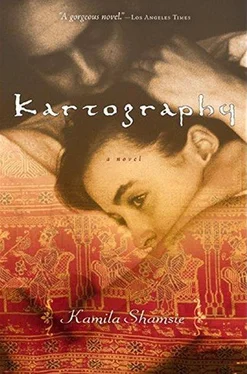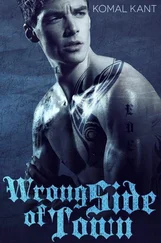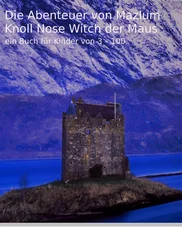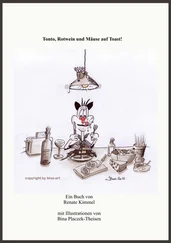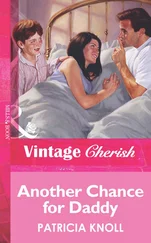‘Uncle Asif gave me his mobile. I called Aunty Laila when I saw your car parked near the hut. She’ll tell…she said she’d let your mother know.’
I just blinked in response. Why didn’t he go away?
He put my shoes down on the sand and went away.
I turned to watch the gulls wheeling between sky and water, and when I looked back again he had gone. I drew my knees up to my chin and hated him.
I heard his footsteps slosh through the water towards me. He had only wandered off a little way, and now he came towards me, one hand filled with pebbles, the other holding something oblong and white. He pulled himself on to the rock beside me and, his feet dangling in the water, placed the pebbles between us. In silence, we took turns skipping the smooth, grey stones across the water. He threw with a flick of the wrist, and I threw with a hopelessly inadequate technique, but I still managed to make my stones skip more than his.
When there were only two pebbles left, we picked up one each and threw them out to sea at the same time. They clinked against each other in the air and spun back towards us. We turned our faces away, and this time it was my hand that moved by instinct, shielding the eye that had a glass-splinter scratch just beneath it. The pebbles splashed in the water, feet away from the rock.
‘April 1987. Last time I was here. Remember?’
I remembered it well. Zia, Sonia and I were trying to put a positive spin on Karim’s departure that summer (‘you’ll be able to eat MacDonald’s Quarterpounder with Cheese all the time’, ‘while we’re melting in the sun, you’ll be wearing all those cool sweaters’, ‘concerts, Karim, concerts!’ ‘Lords, man, Lords’, ‘Not the aristos, idiot, the cricket ground!’), and finally decided that the best thing about being in London was that you were likely to run into people who could give you a record deal. We’d form a band and make demo tapes and Karim would get us a contract. The name, Karim and I decided, was key. Once we had a name for our band, everything else would fall into place even though we couldn’t play any instruments and the only one with a halfway decent singing voice was Zia, and he only sang when seated at a dining table, which might make for interesting conc arrangements. But all those concerns were just minor irritations as long as we had a name. Zia confessed he’d once stayed awake until four in the morning trying to find a suitably catchy name for a pop band.
‘And?’ I said. ‘Didja?’
‘That’s it!’ Karim whooped. ‘That’s our band’s name.’ He used the end of his cricket bat to write in the sand.
‘The Didja Djinns,’ I muttered, remembering.
Karim turned to me on the rock. ‘It’s still a great name.’ He pulled a notebook and tiny pencil out of his back pocket. ‘Let’s resurrect the band.’ He tapped the notebook with his pen. ‘We need song titles. Come on, Raheen.’ I went on looking at him, and he gestured to the note pad again, and wrote:
Don’t Make Whoopie, Save Your Rupee
I took the pen from his hand and wrote:
Paki Up Your Troubles
Karim made a sound of amusement, and took the pen from me. He wrote:
By gum, Begum
And I wrote:
(Kar)achi, nivals and ousing
‘Except Carnival and Carousing are spelt with a “C”,’ Karim pointed out. Somehow, my cheek was resting against his shoulder.
‘Not in Karachi. We worship at the alter of K. Haven’t you noticed all the Ks in business names in Karachi: Karachi Kars, Karachi Karpets, Karachi Kards — not to mention Karat Jewellers, Kwick Kababs, Kleen Kleeners.’
Karim laughed, rocking forward.
‘Idi-oh, you’ll fall off,’ I said, catching him by his collar and pulling him upright. He straightened, turned to face me, and, just like that, all laughter was gone. I let go of his collar, and didn’t know what to say.
Finally, Karim spoke. ‘That essay you sent me. The last city was the City of Friendship. Raya is an anagram of yaar.’
‘Yes.’ I ran my finger over a piece of velvety moss that clung to the rock, just inches away from his hand.
‘I should have seen that.’ The oblong thing he’d been holding was the bone of a cuttlefish. He started to trace around my hand with its pointy edge.
‘You drove over Mai Kolachi to get here,’ I said. ‘You wrote to me about it once, remember?’
I kept my hand planted on the rock while he traced around it, and reached down to the sea with the other hand to pick up a bit of seaweed. It was rubbery, with bubbles along one side filled with liquid. I handed him one end of the seaweed and we started bursting bubbles between thumb and forefinger, hands moving closer and closer together.
‘Yes. I said if they made a road through the mangrove swamps it would cut down the drive to the beach by at least fifteen minutes.’
‘Must have given you a thrill. Driving through the road you predicted.’
‘I wasn’t thinking about roads, Raheen.’
‘Not even for a second?’
He smiled. ‘Maybe half a second.’
‘Mangrove swamps are an endangered species,’ I said.
A wave lurched at us, soaking our lower bodies, washing the seaweed away.
‘I don’t want to see him again. My father. Not ever.’ Karim didn’t say anything. ‘Well, that’s what you want me to say, isn’t it?’ I leaned back on the rock, feeling physically sick. ‘All this time I’ve been trying to understand what had gone wrong between us. I thought it had something to do with maps or my reaction to newspaper headlines or telling you that you’ve become a foreigner, and all along you just wanted me to say I hate my father. That’s all.’ I looked out at the waves curling into themselves and breaking, grey-white, and I felt an overwhelming sense of loss. ‘That’s all.’
‘I thought you knew. I really thought you knew. You were asking questions before I left, Raheen. You were asking my father and Uncle Asif. In a place like Karachi where everyone knew, and plenty of people love breaking bad news, how could I know you’d never find anyone who’d tell you?’
‘Well, a funny thing happened. I stopped asking.’
‘Why?’
It was that gorgeous moment of sunset when the most vibrant colours in the world are pulled towards the sun, the sky shot through with every shade of purple and red and yellow, and everything else darkening. I could remember it all quite clearly now: Aunty Maheen saying to my father, ‘Don’t tell me that feelings can’t change; don’t you dare be the one to tell me that,’ and my parents’ argument afterwards, frightening enough to my sense of order that I had decided I would not ask about this again, not even if it killed me.
‘Because I was smart.’ I almost started crying again. ‘Why did I have to know? What does it benefit us to know? He’s been a good father, Karim, he’s been better than that. You knew how much I idolize, how much I idolized — oh, fuck tenses! You thought I knew what he had done and you never bothered to say you were sorry.’
I jumped down to the sand, lost my footing and fell over in the cold water, my elbow gashing red against a jut of rock. When he reached down to help me, I pushed him away. ‘You found out what he’d said, you thought I’d found out too, and instead of taking even half a second to think of how that would have made me feel you mutilated my letters and sent me maps.’
‘Oh, come on, Ra.’ He pushed himself off the rock. ‘If you can’t understand that instead of thinking about you I’d be thinking about my mother and what he put her through, then you really are the most self-absorbed person I’ve ever met.’
‘Oh, no, you can’t. You can’t accuse me. I’m the perfect friend now.’ I knew I was being absurd but I couldn’t stop. ‘You wanted me to hate my father. My one failure was my refusal to hate my father. Well, I’ve told you now: I want nothing more to do with him. You happy? You miserable bastard, haven’t I just lived up to all your wildest expectations?’
Читать дальше
